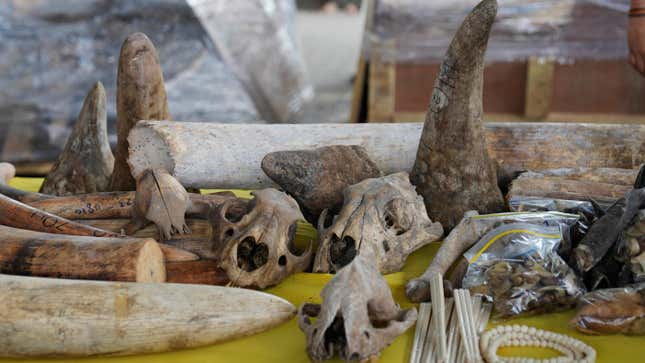
Pangolin scales, African elephant tusks, bones, and animal skulls were among the many items found in a container seized by Malaysian authorities. On July 18 the Royal Malaysian Customs Department said that they discovered the contraband after checks on a ship coming from Africa on July 10. The entire container of contraband was estimated to be worth around $18 million (or 80 million ringgits).
Illegal exports like these are often hidden in containers holding other items. This time they were tucked behind sawn timber. The seized items include: 55 pounds of rhino horns, 220 pounds of pangolin scales, 661 pounds of animal skulls, horns, and bones, and 13,227 pounds of elephant tusks. The rhino horns, pangolin scales, and ivory tusks are believed to have medicinal properties.
International trade of pangolins, which some experts say are the most trafficked mammal, has been banned since 2017, but the illegal trade still continues. There are eight species of pangolin, and exact population numbers are unknown, but the population seems to be in decline according to the World Wildlife Crime Report by the United Nations Office on Drugs and Crime (UNODC). Estimates of the amount of pangolins that have been illegally traded is also difficult to calculate because of things like weight of pangolin scales varying between the species to incomplete seizure records.
International ivory trade has also been banned since 1989 under the Convention on International Trade in Endangered Species. A majority of tusk seizures have been made due to constant investigations, risk-assessments, and tip-offs. This process may be why Malaysia also happens to be one of the top three countries in the world that leads in ivory seizures.
Investigations will continue, the Royal Malaysians Customs Department said in a statement to AP News, and will look at the importer and the shipping agent, but did not provide further details. It is unclear if the contraband was also meant to be shipped to other parts of Asia.